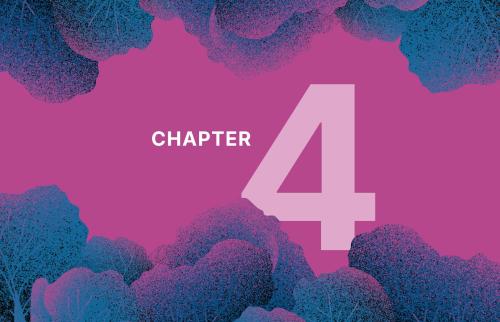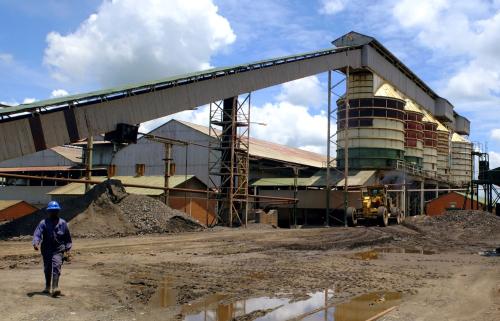This viewpoint is part of Foresight Africa 2024.
The African Growth and Opportunity Act (AGOA) is set to expire in 2025 after serving as the cornerstone of the U.S.-African commercial relationship for nearly the last quarter-century. As Congress and the Biden administration work toward AGOA’s renewal, three critical issues should guide the modernization of the legislation to ensure that it leads to enhanced growth on the continent and deeper commercial ties between Africa and the United States.
These issues are:
- Aligning AGOA with the implementation of the African Continental Free Trade Area;
- Ensuring that every beneficiary has an AGOA utilization strategy; and
- Using AGOA to promote U.S. investment in Africa.
AGOA and the AfCFTA
One of the most significant developments to have taken place on the continent since AGOA was last renewed in 2015 is the ratification of the AfCFTA by 47 African nations and the creation of a secretariat in Accra. Designed to create a USD 3 trillion free trade area, which would be the largest in the world, the AfCFTA will be instrumental in reducing poverty and inequality on the continent and accelerating economic diversification, value addition, and structural transformation.
As an initial step toward alignment with the AfCTA, Congress should consider the proposal by Senator Chris Coons to modify AGOA’s rules of origin to allow inputs from North African AfCFTA countries—presently excluded from AGOA—to count toward the requirement that 35% of a product’s value originate in the region.
The U.S. should also continue the strategic working groups and the annual summit process that were established in the MOU with the AfCFTA secretariat during the December 2022 African Leaders Summit.
National utilization strategies
When Congress extended AGOA in 2015, it urged all beneficiaries to develop national utilization strategies. According to USTR, only 16 have done so. Those countries that have developed AGOA strategies have seen increases in their exports to the U.S. Togo saw an increase of 91% of its agricultural exports to the U.S. between 2017 and 2020; Mozambique increased its AGOA exports by 813% between 2018 and 2020, again largely agricultural products; and Zambia increased its exports over 3,000%, including semi-precious stones, pearls, and copper.
The Biden administration should work with every AGOA beneficiary to develop and implement an AGOA utilization strategy.
AGOA should be modernized in several ways to provide policy certainty and support for American companies entering the African market.
Supporting US investment in Africa through AGOA
Since AGOA was last extended, there has been a steady decline in U.S. investment in Africa from a high of $69 billion in 2014 to $44.81 billion in 2021. Although it ticked up to $46.17 billion last year, the reality is that most American companies see the African market as a risk as opposed to an opportunity.
AGOA should be modernized in several ways to provide policy certainty and support for American companies entering the African market.
One strategy for lowering the risk and increasing the return on investment is through investment incentives. In 1976, the U.S. tax code granted U.S. companies a tax exemption for investing in Puerto Rico, which helped to drive GDP growth from -0.3% to 10% the last quarter of 20th century. More recently, the Inflation Reduction Act (IRA) included a range of tax credits to spur investments in electric vehicles and clean energy technologies.
In modernizing AGOA, Congress should consider introducing a credit similar to the one in the IRA to incentivize U.S. companies to make job-creating and value addition investments in specific sectors in AGOA eligible countries, including critical minerals and supply chains, digital infrastructure and skilling initiatives, renewable energy systems and grids, manufacturing (e.g., automobiles, apparel), agriculture and food security, and health services and vaccine production.
Congress could also amend the IRA to include all AGOA-eligible countries, as Vera Songwe and I have advocated, given that the legislation’s investment incentives only apply to those countries with whom the U.S. has free trade agreements. Morocco is the one country on the continent with whom the U.S. has an FTA.
AGOA creates another uncertainty for American companies as it stipulates that countries will lose eligibility once they achieve “high income” status, as defined by the World Bank’s GDP per capita status. Seychelles, as an example, was “graduated” from AGOA in 2017 for reaching developed country status. To enhance investor certainty, Congress should consider the Coons proposal that would ensure countries do not lose eligibility until they achieved “high-income” status for five consecutive years.
Central to contributing a predictable investment environment in Africa is the length of time that AGOA might be renewed. Senator John Kennedy has introduced legislation that would extend AGOA for 20 years, to 2045. This would be ideal. The Coons legislation proposes an extension of 16 years, which would be consistent with the U.S.-Mexico Canada Agreement. This would also be very beneficial. In fact, anything less than 10 years will contribute to investment policy uncertainty for American companies contemplating entering the African market.
AGOA’s conditionalities have also exacerbated the uncertainty of the African market for U.S. companies. As part of the original legislation, conditionalities have largely been used to deny AGOA benefits to countries where coups, conflicts, or significant human rights abuses have occurred. In practice, the individuals who are more likely to suffer the consequences of lost AGOA benefits are those who are assembling products for export to the United States—in most instances, women employees.
When Madagascar lost its benefits after the 2009 coup, over 26,000 jobs were lost. Following the termination of Ethiopia’s preferences on January 1, 2022 for the government’s role in the Tigray conflict, an estimated 20,000 jobs were lost after a number of apparel manufacturers, including PVH and H&M, decided to stop manufacturing.
Today, the United States has a range of sanctions, such as the Global Magnitsky Act, that it can use to hold accountable those responsible for initiating conflicts, perpetuating human rights abuses, widespread corruption, or electoral fraud. A more focused sanctions strategy would help the U.S. to avoid hurting the very people AGOA was intended to support. Furthermore, AGOA eligibility should be reviewed every six years. This would be similar to the provision in the U.S.-Mexico-Canada Agreement that provides for a “joint review” of the accord six years after its entry into force. Currently there is an annual eligibility review for all AGOA countries, which leads to more policy uncertainty than clarity.
AGOA has been one of the most enduring pillars of the U.S.-African relationship. It has great potential to do more for all stakeholders.
The Brookings Institution is committed to quality, independence, and impact.
We are supported by a diverse array of funders. In line with our values and policies, each Brookings publication represents the sole views of its author(s).









Commentary
Modernizing AGOA for the 21st century
February 15, 2024